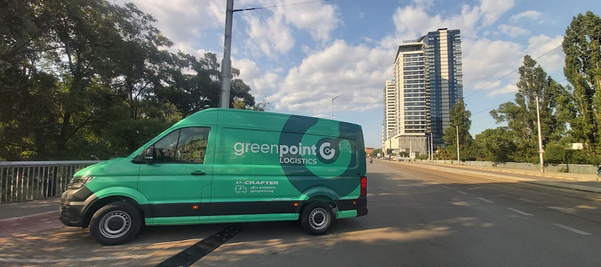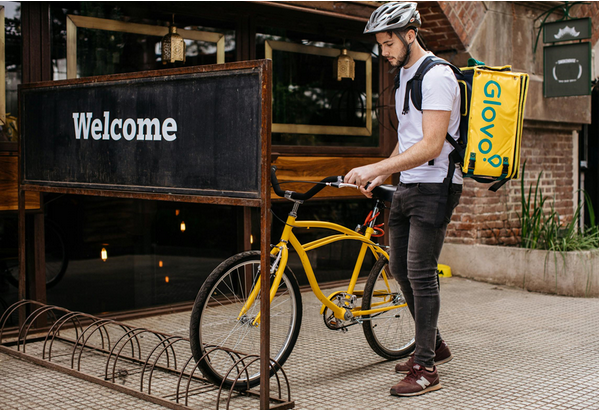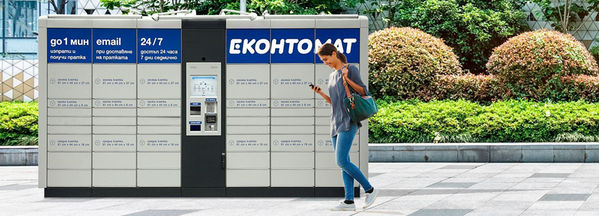In an era of climate challenges, increasing urbanisation and the growth of online commerce, the logistics sector faces a critical need to rethink its operations. Bulgarian companies are demonstrating that sustainability can be both an environmentally responsible solution and a strategic competitive advantage. From electric vehicles to recyclable packaging materials to digital technologies, modern logistics companies are developing comprehensive approaches to reduce the carbon footprint of last-mile logistics and greener cities.
Transport and delivery in the heart of the city with all-electric vehicles - Greenpoint Logistics
Greenpoint Logistics is the first CO₂-neutral logistics company in Bulgaria specialising in deliveries with all-electric vehicles. They offer express same-day deliveries in Sofia and surrounding cities, as well as electric van rental. The company uses solar power to charge their fleet, further reducing the carbon footprint of their operations.

source: Greenpoint Logistics
Technology solutions for route optimization and fuel consumption reduction - Frotcom in Bulgaria
Frotcom Bulgaria offers innovative technological solutions for optimization of logistics operations. Their integrated fleet management platforms enable transport companies to achieve significant efficiency improvements while reducing fuel costs and carbon footprint. The specific case of their client Flynn RoadFreight illustrates how by implementing specialist software systems such as AllRound Systems, better tracking of operations, more efficient distribution of freight and route optimisation can be achieved. Technology solutions include intelligent route planning, real-time GPS tracking and detailed driving style analysis, enabling companies to realize up to 20% fuel savings while transforming their logistics operations, turning sustainability from a challenge into an opportunity for competitive advantage.
Folding pallets and CNG trucks - Kaufland Bulgaria
Kaufland Bulgaria takes several environmentally friendly measures in its logistics. More than 90% of deliveries to hypermarkets are made with CNG trucks. Since 2019, the company has been using EPS (Euro Pool System) pallets to transport fruit and vegetables. These pallets are completely innovative – they are foldable, 100% recyclable and designed for multiple use. By introducing these pallets, Kaufland has been able to reduce the number of return transport journeys, further helping to reduce carbon emissions.
Bicycle dock and paperless receipt option - Glovo Bulgaria
Glovo has established itself as a modern procurement platform that makes environmental responsibility a key element of its business strategy. At the heart of this transformation are two approaches: the use of bicycles for urban deliveries and the introduction of completely paperless receipts.
Bicycles are ideal for the urban environment – they can manoeuvre quickly in heavy traffic, do not create congestion, even in busy time zones, do not emit harmful gases, and significantly reduce fuel costs and traffic noise.
In parallel with the transport revolution, the company is also undertaking a digital transformation of its document workflow. Traditional paper receipts have been replaced by electronic receipts, accessible directly in the mobile app.

Source: Glovo
Innovative mailboxes for parcel delivery and recyclable packaging - Econt
Econt demonstrates a comprehensive approach to environmental responsibility that goes beyond traditional logistics practices. They have introduced a system of automated mailboxes (Econtomats), which represent a modern technological solution for contactless parcel collection. These smart boxes are strategically positioned in accessible locations in urban areas – shopping malls, gas stations, company offices, transforming the traditional delivery model and contributing significantly to the sustainability of urban logistics. The essence of this approach lies in the shift from individual, point-based
deliveries to a centralized hub-model. Instead of couriers make multiple individual home deliveries, they consolidate shipments at strategically located automated points. This model generates direct environmental benefits – drastically reducing miles traveled, more efficient use of transportation capacity, and therefore significantly reducing carbon emissions. The classic door-to-door delivery model involves the risk of failed attempts – the customer may be absent, forcing the courier to make repeat rounds. Automated mailboxes eliminate this problem by allowing recipients to pick up their parcels at a time convenient to them, without requiring additional transportation costs.
Another essential aspect is the use of recyclable as well as already recycled packaging materials. In addition, they optimise their processes to reduce the use of unnecessary resources, organise separate collection and recycling of waste, and adapt their operations to reuse any material or product.

Source: Econt
Last mile transformation in logistics goes beyond technological innovation – it represents a fundamental shift in the way we think about urban mobility and sustainability. Bulgarian companies are showing that green solutions in last-mile delivery are an investment – in cleaner air, a better urban environment and a more responsible green future. Every electric delivery, every recycled package and every optimised route are small but significant steps towards building a more sustainable logistics ecosystem.
